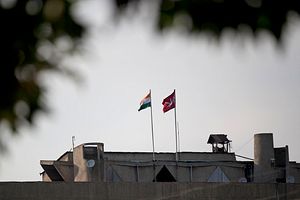After a gap of several months, political activity is beginning to sprout once again in the Kashmir Valley. Both old and fresh faces of Kashmir’s mainstream politics promise new political fronts and a fresh vision for yet another “Naya Kashmir.” Quite understandably, the political leadership in Delhi is trying to infuse vigor into this political activity, hoping it can help to address discontent following the August 2019 decision to revoke Jammu and Kashmir’s special status and transform the former state into a union territory. While the politics of alternatives isn’t new to Kashmir, the current atmosphere bears a stark resemblance to the 1960s, when the Indian National Congress tried to consolidate their control over the political and administrative affairs of the state of Jammu and Kashmir.
The installation of Bakshi Ghulam Mohammad as prime minister of the state, following the dismissal of Sheikh Abdullah in 1953, was the first move aimed at creating an alternative government, one acquiescent to Congress’ central leadership. His decade-long tenure removed apprehensions that Sheikh’s wavering loyalty had raised. However, it did not prevent the central leadership of the Congress from aspiring for a permanent alternative. Bakshi’s resignation under the Kamraj Plan opened up this possibility.
The Congress found Ghulam Mohammad Sadiq to be a perfect fit for its requirements. Sadiq, a National Conference dissident and founder of Democratic National Conference, won the 1967 election and led the first elected Congress government in the state. While this allowed the central leadership direct control, the move failed to achieve its aim of penetrating down to the masses – something the Congress has still not been able to do. Instead, the Sadiq government constantly depended on the central leadership for directions. This failure laid the ground for handing the reins back to Sheikh Abdullah in 1972.
In its pursuit of breaking the impasse and restoring political processes in Kashmir, the present government is perhaps seeking to create its own ruling class that will be dependent upon the center, both legally and politically. While they have chosen to avoid the older guard of Jammu and Kashmir’s political parties, the central leaders also do not seem to be interested in identifying and elevating the second-rung leadership. However, the continuous detention of these political figures keeps them relevant on both sides of the political discourse.
What is transpiring in the political circles of Kashmir is certainly not a new strategy. Armchair politicians and seasoned turncoats have traditionally been used to lay a fresh political ground in Kashmir, even though the practice is antithetical to restoration of democratic processes. This practice ignores the very fact that in a complex political environment where alienation is deep-rooted, alternatives cannot evolve in vacuum.
Any alternative to the older guard in Kashmir has to be broad-based. It has to have the patronage of the masses, a strong network of workers capable of mobilization and electoral experience. For now, the capacity to mobilize masses may be seen as a threat to public order, but it is precisely what is required to restore political processes.
Naveed Mehmood Ahmad is currently working as Legal Research Fellow in New Delhi. He has a Masters in Law from Tata Institute of Social Science, Mumbai.

































